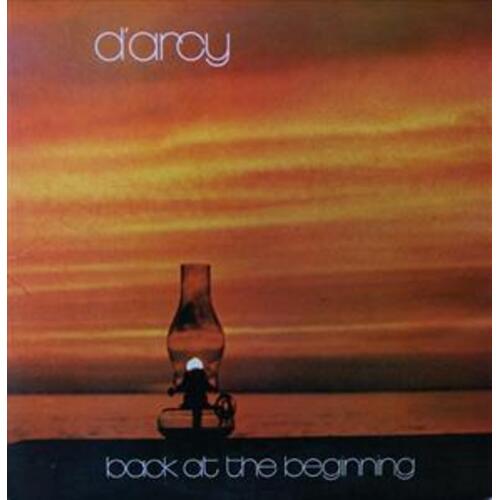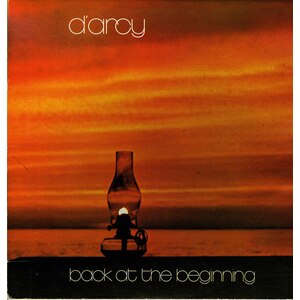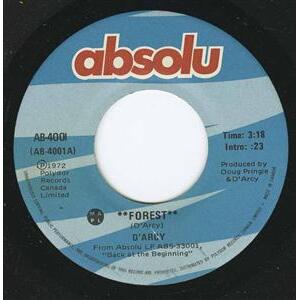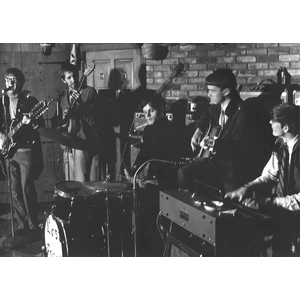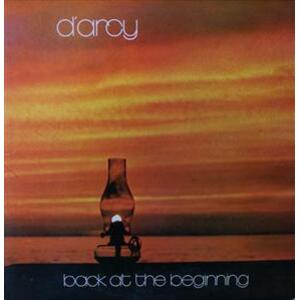D'Arcy (Darcy Draper)
Websites:
No
Origin:
Montréal, Québec, 🇨🇦
Biography:
Born and raised in Montreal, Darcy Draper grew up surrounded by music. By the mid-1960s, he had already immersed himself in the city’s thriving garage band scene, fronting local acts like Black Sheep and Lost and Found—bands that cut their teeth playing fraternity parties and high school dances across Montreal. Though mostly known for their cover sets, these early groups gave Draper his first taste of stage experience and band dynamics.
By 1969, Draper felt the urge to explore deeper personal expression and transitioned to acoustic songwriting. This shift brought him into collaboration with guitarist Dick Kelder, forming a short-lived but visionary duo named Mantra. Draper’s introspective lyrics and Kelder’s melodic textures resulted in a set of original songs that stood apart from the era’s typical folk output. Their self-titled LP, recorded in a whirlwind two-day session at Montreal’s Champagne Studios, was released on M.M.&C. Records in 1970—an otherwise country/folk imprint that took a chance on the pair’s stark and poetic sound. Despite limited performances, Mantra captured the attention of CHOM-FM’s Doug Pringle, leading to on-air performances and radio play.
After Mantra’s quiet dissolution, Draper carried forward the creative flame. In 1971, he opened a series of local shows for Mashmakhan, thanks to an invitation from the band's manager, Donald K. Donald. These shows, performed alongside Mantra alumnus Graeme Lennox, built key relationships that would shape Draper’s next and most ambitious studio project.
That opportunity came in 1972, when Doug Pringle helped secure studio time at Montreal’s Studio Six and a distribution deal through Polydor. With Lennox and Mantra bassist Pierre Fauteux onboard, Draper expanded his sonic ambitions and invited elite local players to contribute—most notably Jerry Mercer and Rayburn Blake of Mashmakhan, and Denis Forcier, a well-established Montreal guitarist. The project took shape under the name D’Arcy.
The resulting album, Back at the Beginning, is a luminous artifact of early 1970s Canadian folk-rock. Draper’s songwriting blends gentle melancholy with bursts of instrumental colour—from Tim Forsythe’s keyboard flourishes to Abner’s haunting flute and Roger D’loger’s percussion. Though not widely promoted, the album gained local airplay, especially on CHOM-FM. The single "Forest" b/w "Fly to the Sky" was issued on Absolu/Polydor, and today the LP is a prized rarity among collectors.
Despite strong material and a top-tier lineup, D’Arcy never toured. Life commitments pulled members in different directions, and without a proper touring unit, the band quietly folded. Mercer soon joined April Wine, and Blake went on to play with Riverson and the Lisa Hartt Band.
Back at the Beginning was never reissued and remains one of the era’s lost gems—a melancholic, atmospheric, and exquisitely played album that bridges the folk-psych sound of the late '60s with the introspective singer-songwriter movement of the early '70s. Draper’s voice—both literal and lyrical—carries the soul of the album, and his work, though too little known, deserves its place among the finest examples of Canadian independent music from the time.
Darcy Draper was among the first ten artists to join the Museum of Canadian Music when it launched in 2010. His contribution to Canada’s folk-rock canon remains a singular and enduring statement.
-Robert Williston
D'arcy Draper (Mantra): accoustic guitar, harmonica, lead vocals
Graeme Lennox: keyboards, vocals
Jerry Mercer (Roy Buchanan, April Wine, Revival, Mashmakhan, The Wackers): drums, vocals
Pierre Fauteux (Mantra): bass, vocals
Rayburn Blake (Mashmakhan, Riverson, Cliff Edwards, Lisa Hartt Band): electric guitar on "Forest" and "Are You Coming"
Tim Forsythe (Our Generation, The Haunted, Peter & the Pipers, J.B. & the Playboys): piano on "Are You Coming" and organ on "Sunflower" and "Forest"
Denis Forcier (Toulouse, Yves Lapierre, Le Coeur d'une generation, Boule Noire, Les Sultans): electric guitar on "Back at the Beginning" and "One Free Dream"
Abner: flute
Roger D'loger: percussion
Produced by Doug Pringle & D'arcy
Arrangements by Graeme Lennox & D'arcy
mixing Engineer: Quenton Meek
Album gatefold design by The Other Studio
